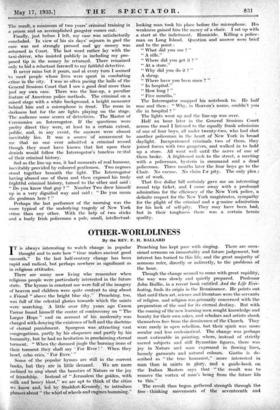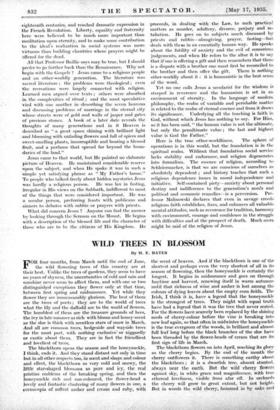OTHER-WORLDLINESS
By the REV. F. H. BALLARD
IT is always interesting to watch change in popular thought and to note how " time makes ancient- good uncouth." In the last half-century change has been rapid and radical, but perhaps nowhere as significant as in religious attitudes.
There are many now living who remember when religious people were particularly interested in the futtire state. The hymns in constant use were full of the imagery of heaven and children were quite content to sing about a Friend " above the bright blue sky." Preaching, too, was full of the celestial glories towards which the saints were marching. A little over fifty years ago Canon Farrar found himself the centre of controversy on " The Larger Hope " and on account of his modernity was charged with denying the existence of hell, and the doctrine of eternal punishment. Spurgeon was . attracting vast congregations, partly by his eloquence and partly by his hunianity, but he had no hesitation in proclaiming eternal torment. " When the damned jingle the burning irons of their torment thiy shall say ' For Ever ! ' When they howl, echo cries; ' For Ever.'
Some of the popular hymns are still in the current books, but they are in little .demand. We are more inclined to sing about the beauties of Nature or the joy of friendship. Instead of " Jerusalem the golden, with milk and honey blest," we arc apt to think of the cities we know and, led by Studdert-Keimedy, to introduce phrases about " the whirl of wheels and engines humming." Preaching has kept pace with singing. There are occa- sional sermons on immortality and future judgement, but interest has turned to this life, and the great majority of sermons refer, directly or indirectly, to the problems of the hour.
Though the change seemed to come with great rapidity, the way was slowly and quietly prepared. Professor John Baillie, in a recent book entitled And the Life lasting, finds its origin in the RenaiSsance. He points out that until then art, science and literature were the servants of religion, and religion was primarily concerned with the preparation of the soul for its eternal destiny. But with the coming of thenew learning men sought knowledge and beauty for their own sakes, and scholars and artists shook themselves free from the dominance of the Church. They were rarely in open rebellion, but their spirit was more secular and less ecclesiastical. The change was perhaps most -noticeable in painting, where, instead of strictly Sacred subjects and stiff Byzantine figures, there was joy in Nature and man expressed in flowing lines, homely garments and natural colours. Giotto is de- scribed as " the true humanist," more interested in man than in saints in glory, and a guide-book on the Italian Masters says that " the result was to remove the vortex of man's being from the future life to this." ' The revolt thus begun gathered strength through the free - thinking movements of the seventeenth and • eighteenth centuries, and reached dramatic expression in the French Revolution. Liberty, equality and fraternity - here were believed to be much more important than meditation upon eternity, and to make some contribution to the ideal's realization in social systems was more virtuous than building chantries where prayers might be offered for the dead. • All that Professor Baillie says may be true, but I should prefer to go further back than the Renaissance. Why not begin with the Gospels ? Jesus tame to a religious people and an other-worldly generation. The literature was sacred literature ; the problems were theological ; even the recreations were largely connected with religion: Learned men argued over texts ; others were absorbed _ in the complexities of ritual ; and the most speculative vied with one another in -describing the seven heavens and discussing problems of marriage in the eternal city whose streets were of gold. and walls of jasper and gates of precious stones. A book of a later date reveals the thoughts of many generations and in it Heaven is described as " a great space shining with brilliant light : and blooming with unfading flowers and full of spices and sweet-smelling plants, incorruptible and bearing a blessed fruit, and a perfume that spread far beyond the boun- daries of the land."
Jesus came to that world, but He painted no elaborate picture of Heaven. He maintained considerable reserve upon the subject, and when He spoke it was in such a simple yet satisfying phrase as " My Father's house." To people who talked freely about hidden mysteries Jesus was hardly a religious person. He was lax in fasting, irregular in His views on the Sabbath, indifferent to most of the things that were considered important. He was a secular person, preferring feasts with publicans and sinners to debates with rabbis or prayers with priests.
What did concern Jesus ? Anyone can find the answer by looking through the Sermon on the Mount. He begins with a description of the blessed life and the character of those who are to be the citizens of His Kingdom. He proceeds, in dealing with the Law, to such practical matters as murder, adultery, divorce, perjury and re- taliation. He goes on to subjects much discussed by priests and rabbis—almsgiving, prayer, fasting—but deals with them in an essentially human way. He speaks about the futility of- anxiety and the evil of censorious judgements, and when He refers to the altar it is to say that if one is offering a gift and then remembers that there is a dispute with a brother one must first be reconciled to the brother and then offer the gift. There is nothing other-worldly about it : it is humanistic in the best sense of the word.
Yet no one calls Jesus a secularist for the wisdom is steeped in reverence and- the humanism is set in an environment of eternity. In the language of modern philosophy, the-realm of variable and perishable matter is related to the realm of eternal essence and from it draws its significance. Underlying all the teaching is faith in God, without which Jesus has nothing to say. For Him, as it has been said, " the human value is not the ultimate, but only the penultimate value-; the last and highest value is God the •Father."
Here is the true other-worldliness. The sphere of operations is in this world, but the foundation is in the spiritual realm. Withbut that foundation social service lacks stability and endurance, and religion degenerate's into formalism. The essence of religion, according to Schleiermacher, is that we are conscious of ourselves as absolutely dependent ; and history teaches that such a religious dependence issues in moral independence and initiative. Self-contained piety—anxiety about personal destiny and indifference to the generation's needs and political and economic remedies—is a perversion. Pro- fessor Malinowski declares that even in savage creeds religious faith establishes, fixes, and enhances all valuable mental attitudes, such as reverence for tradition, harmony with environment, courage and confidence in the struggle with difficulties and at the prospect of death. Much more might be said of the religion of Jesus.











































 Previous page
Previous page